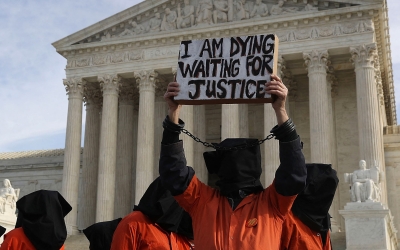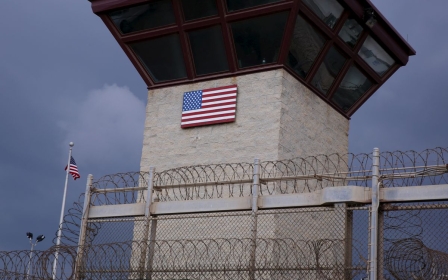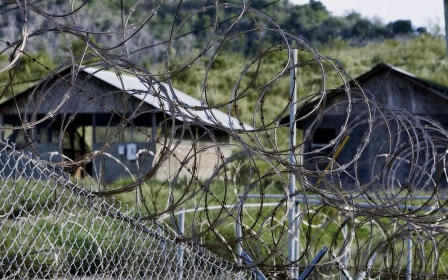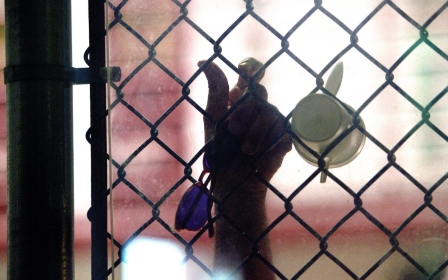World Cup 2026: Ex-Guantanamo detainees challenge US hosting of event
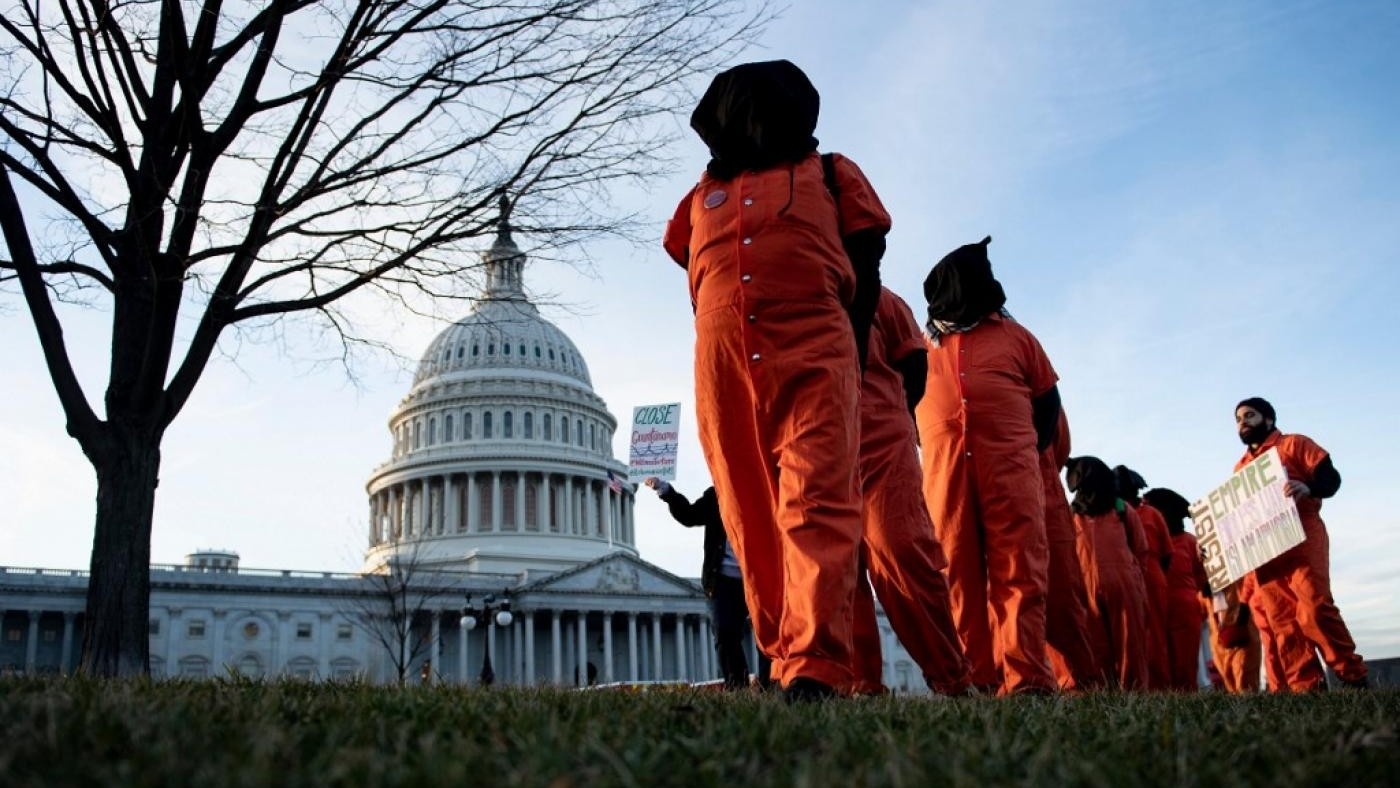
Former Guantanamo Bay detainees have questioned the United States' suitability as joint host for the 2026 World Cup, citing their unlawful detainment at the notorious prison complex and a litany of abuses committed over 21 years during the US-led "war on terror".
The US won the bid to host the next tournament alongside Canada and Mexico in 2018, but the decision has faced renewed criticism following the recent Qatar World Cup.
Mansoor Adayfi, a Yemeni citizen who spent 14 years in US captivity and was never charged with a crime, told Middle East Eye that issues currently being raised such as union restrictions, equitable hiring, worker protections, and a commitment to a livable wage were just the tip of the iceberg.
Thirty-nine prisoners are being held on the US-owned enclave in Cuba, among whom 13 have already been cleared for transfer. Most have been held without formal charges.
'I believe that countries and people should boycott World Cup 2026'
- Mansoor Adayfi, former Guantanamo detainee
"When it comes to the 2026 World Cup, I don't think it should be held in the United States. The US is not qualified to host this kind of event," Adayfi, who in 2016 was extradited to Serbia where he lives alone, told MEE.
New MEE newsletter: Jerusalem Dispatch
Sign up to get the latest insights and analysis on Israel-Palestine, alongside Turkey Unpacked and other MEE newsletters
"Look at the history of human rights abuses. Over the last 20 years, if you wanted to define the United States, how would you? Abu Ghraib? Black sites? Guantanamo?" he added.
Adayfi spent the 2002, 2006, 2010, and 2016 World Cups at the prison where he says he endured torture, humiliation and abuse. He was only 18 when he was arrested in Afghanistan, a few months before he was set to begin university.
A startling 86 percent of the detainees at Guantanamo were captured after the US distributed flyers in Pakistan and Afghanistan offering huge bounties for "suspicious people".
From those detained, 55 percent were determined not to have committed any hostile acts against the US or its coalition allies and only eight percent were characterised as al-Qaeda fighters.
Now that Adayfi is free, he says his detention is one reason among many why the US should not be allowed to host the tournament.
"We haven't seen any acknowledgment, justice, or accountability for what happened. Over a million died [as a result of the war on terror], tens of millions were displaced, and tens of thousands were kidnapped, tortured, and indefinitely imprisoned," Adayfi said.
"The United States shouldn't be allowed to host the World Cup until it sets its record straight on human rights. I believe that countries and people should boycott World Cup 2026 if it's going to be held in the US or in a country that has issues with human rights."
Degree of separation
The hosts of international sporting events like the World Cup are often subject to criticism, as was seen with Qatar where much of the media coverage was focused on LGBTQ rights and the labour conditions of predominantly South Asian migrant workers.
These criticisms, however, are less often raised when a World Cup is held in a western country, such as France, England or the US, Shayana Kadidal, managing attorney at the Center for Constitutional Rights, told MEE.
"The issue of sportswashing, as it's kind of fashionable to call it, should exist for every country that boasts one of these big events. The US benefits from it passively."
"The US is an imperial power and projects its coercion everywhere outside of our borders."
He added that the wealth obtained by the US isn't seen as a human rights concern, given that "the imperial violence behind that money being in here in the US is hidden by one degree of separation".
Part of that separation, Kadidal said, is the ability to keep those rights abuses out of the public eye.
The details of the lethal US drone programme, for example, were kept classified until military whistleblower Daniel Hale intervened. He was then arrested and sentenced to 45 months in prison last year for violating the Espionage Act of 1917.
And despite the city of Miami, Florida, being near Guantanamo, severe restrictions on visiting and reporting on the military base make it difficult for reporters to uncover what takes place there.
"The whole thing's conveniently away in a little colony," Kadidal said.
"None of the journalists are going to take the three days off between later rounds in the knockout stages and go by and do investigative pieces in between games by touring the facility. It has very effectively been forgotten about."
However, the World Cup being in the US is also an opportunity to shed light on these issues at a time when the entire world is looking at the country.
"I think it should be an occasion for raising questions about the US's human rights record in every one of the places where it projects its imperial power, including colonies like Guantanamo and Puerto Rico. That's absolutely a legitimate use of protesting the 2026 World Cup," Kadidal said.
Raising justice every year
Since the 9/11 attacks in 2001, the US has led multiple invasions in Iraq and Afghanistan. In Iraq, the Abu Ghraib prison served as a symbol of the torture conducted by the US military abroad.
The US has also conducted a covert lethal drone programme that has killed 3,797 people, including 324 just under the Barack Obama administration, according to the Council on Foreign Relations.
A report from Brown University's Costs of War Project has found that the US-led "war on terror" has killed nearly one million people globally and cost more than $8 trillion since it began nearly two decades ago.
Another report found that on top of those deaths, the conflicts that the US engaged in post-9/11 have resulted in the displacement of more than 37 million people.
'Raising the issue of human rights violations by the US should be raised constantly, not just in the run-up to the World Cup'
- Former Guantanamo detainee
And in the aftermath of the 9/11 attacks, the US rounded up hundreds of Muslim men from across the world, holding them indefinitely at the notorious Guantanamo Bay prison.
"Qatar's human rights record has been in the spotlight ever since the nation was chosen to host this year's World Cup. So it's only right that media organisations subject the United States to the same level of scrutiny, given that it will be hosting the tournament in four years," said Shivan Sarin, deputy director of Reprieve US.
"Will reporters ask tough questions about Guantanamo Bay, where almost 800 men were detained without charge or trial, or about armed US drone strikes that continue to kill civilians far from any battlefield?"
Sarin said that without holding the US to a similar level of criticism to that of Qatar, it would perpetuate a "damaging double standard" that only some countries should be subject to criticism.
One former Guantanamo Bay detainee, who requested anonymity due to fear of reprisals, said that while the World Cup was a great opportunity to raise these issues, the abuses by the US military should be constantly discussed.
"Raising the issue of human rights violations by the US should be raised constantly, not just in the run-up to the World Cup but rather every year," he said in a statement seen by MEE.
"Especially when, shamelessly, the US foreign ministry announces its annual human rights reports accusing many countries of human rights violations but turns a blind eye on Guantanamo and the indefinite detention of hundreds of people since 2002."
Middle East Eye delivers independent and unrivalled coverage and analysis of the Middle East, North Africa and beyond. To learn more about republishing this content and the associated fees, please fill out this form. More about MEE can be found here.


